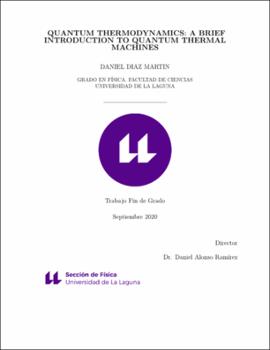Quantum thermodynamics: a brief introduction to quantum thermal machines
Author
Díaz Martín, DanielDate
2020Abstract
El objetivo de traer al lector una revisi´on acad´emica simple del importante reciente campo
de investigaci´on de la Termodin´amica cu´antica es el eje central de este proyecto. Para
conseguirlo nos centramos en las m´aquinas t´ermicas cu´anticas. Una introducci´on a este
importante tema es presentado junto al concepto de m´aquinas t´ermicas endoreversibles. En
primer lugar, mostramos un estudio de su rendimiento motivado por un modelo cu´antico:
Un Maser de tres niveles junto a unos resultados muy interesantes de su comportamiento.
Posteriormente, con la idea de entender como funciona la din´amica de estos dispositivos
nos moveremos a la teor´ıa de sistemas cu´anticos abiertos mostrando la derivaci´on de una
herramienta matem´atica muy importante en el campo de la Termodin´amica cu´antica: La
ecuaci´on maestra Markoviana. Para finalizar, aplicaremos esta ecuaci´on a un sistema
espec´ıfico observando como la primera y segunda ley de la termodin´amica emergen de su
din´amica. The purpose of bring the reader and academical and modest review of the emerging research
field of Quantum Thermodynamics is the central axis of this project. To do that we focus on
quantum thermal machines. An introduction to this important subject is addressed along with
the notion of endoreversible thermal machines. First, we present a study of thermal devices
performance utilizing a particular quantum model: The Three Level Maser, from which
rather general results can be derived. The idea is to understand in simple terms how the
dynamics of this type of systems works. Later, we will introduce some basic elements of the
theory of open quantum systems showing the derivation of an important mathematical tool
in Quantum Thermodynamics: The Markovian master equation ruling the reduce dynamics
of the system of interest. To finish, we apply this equation to an specific system and see how
the I-law and II-law of thermodynamics emerge in this context.





